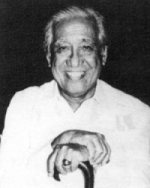
|
Philippines, 02 Mar 2026 |
Home >> News |
 |
||||
|
|
|
|
The late Senator Tañada, the athlete By Eddie Alinea PhilBoxing.com Fri, 01 Jun 2018  Last Monday, May 28, marked the 26th death anniversary of former Senator Lorenzo Martinez Ta?ada, a Filipino nationalist, the longest-serving member of the Upper House (24 years from 1947 to 1971). Not known to any, Senator "Tanny" as he was popularly called when he was alive, was a top-notch football player and had, in fact, played for two national teams in the now-defunct Far Eastern Games, forerunner of the now Asian Games. The late nationalist, thus, became the first of five Filipino athletes who became senator, a testament that sports is not only a vehicle in a nation's efforts to build a strong and healthy citizenry, but a breeding ground as well for future leaders. That Sen. Tanny's accomplishment as an athlete-turned government servant was duplicated by basketball luminaries Ambrosio Padilla, Robert Jaworski and Freddie Webb, bowler Tito Sotto and only recently, boxing icon Manny Pacquiao, further attest to the fact that the framers of the Philippine Constitution did not err in mandating the government to provide the citizens of an effective sports development program. Add the names of 1932 Los Angeles Olympic Games bronze medalist in high jump Simeon Toribio, who was elected congressman of the second district of Bohol upon retirement from active competitions, Mayor Arsenio Lacson, stil up to now acknowledged as the "Best Chief Executive? the country?s capital city ever had and Caloocan Macario Asistio Sr., among others, to further strengthen the resolve that sports, indeed, plays a major role in developing good leaders. Still, include quiet a number of athletes who have been and presently serving as congressmen, governors, mayors and even councilors in their respective municipalities, cities and provinces. Ta?ada, Philippine Senate's Minority Floor Leader from 1953 to 1957, saw action as a goalkeeper in the Sixth FEG held in Osaka in 1923 and the seventh staging of the tri-nation conclave hosted by Manila in 1925. The Philippines ended up runner up to eventual football winner China on both occasions. The Philippines finished second to eventual overall champion Japan in 1923, but came back stronger two years later in their home turf, dropping the Japanese to second overall. Ta?ada's teammates in the 1923 FEG were Jesus Cui, Jesus Esteva, Rafael Fuentes, Ernesto Hernaez, Joaquin Lopez, German Manzano, Emilio Pacheco, Francisco Quintana, E. V. Sison, Salvador Vallejo, Alberto Vllareal, B. Baylon and S. Baylon. Ta?ada, also a one-time Solicitor General, came back two years later along with Cui, Hernaez, Lopez and Manzano and matched the Philippines' second best finish in a team up with newcomers and fellow football greats Sebastian Ugarte and Virgilio Lobregat, Mariano Sangle, Eduardo Yrezabal. Victoriano Bernardo, Y. R. Cartajena, Miguel Diaz, Baldomero Fernandez, Juan Manalac, Felix Pintado, Luis Pradera, Florentino Reyes, Walter Short, Ildefonso Tronqued, Alberto Villareal, Angel Villareal, Fernando Villareal and Jose Villareal. Senator Ta?ada was born on August 10, 1898 in Gumaca, Quezon. He started primary school at the elementary schools in Gumaca and Antimonan, Quezon and completed his intermediate and secondary education at the De La Salle College. He obtained his AB. and law degrees from the University of the Philippines; Master of Laws from Harvard University; and Doctor of Civil Law from the University of Santo Tomas. In 1929, he became assistant city fiscal of Manila. In 1936, after having received his doctorate degree, Justice Francisco Delgado invited him to form the law of Delgado and Ta?ada. In 1945, President Osme?a appointed him judge of the Court of the First Instance of Manila. That same year, he was named solicitor general and chief of the Office of Special Prosecutors. It was in the latter capacity where he projected his type of persuasion; he believed that truth and social justice and honest government were the means to keep the people happy in the pursuit of their sovereign rights. Ta?ada was elected senator in 1948 and was re-elected in 1953, 1959 and 1965. He is the president of the Nationalist-Citizens Party under whose banner he ran for vice-president together with presidential candidate Claro M. Recto. The legislative record of Ta?ada speaks well for itself; he sponsored the bill requiring government officials to make public their assets and liabilities, which was made the basis for the impeachment of one Supreme Court Chief Justice and the removal by quo warranto of the other; The Ta?ada Picketing Law which gives protection to laborers on strike; the law changing the Philippine Independence Day from July 4th to June 12; and the infamous bill which prohibits discrimination in the employment of persons by corporations. Another important bill to his credit is the law, which prohibits and penalizes wiretapping and other related violations of the privacy of communication. Because of this distinguished record as a public official, several organizations have singled him out for numerous awards. Senator Ta?ada has demonstrated that a career in public service and a Christian way of life is possible, as it should be emulated. Click here to view a list of other articles written by Eddie Alinea. |
|
|
PhilBoxing.com has been created to support every aspiring Filipino boxer and the Philippine boxing scene in general. Please send comments to feedback@philboxing.com |
PRIVATE POLICY | LEGAL DISCLAIMER
developed and maintained by dong secuya © 2026 philboxing.com. |